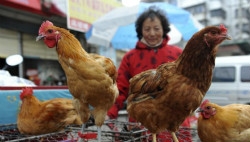
From VOA Learning English, this is the Health Report.
A World Health Organization official says a new strain of avian influenza is unusually dangerous for people.
Keiji Fakuda is the WHO's assistant director-general for health security and environment. He spoke to reporters in Beijing last week about the H7N9 bird flu virus. As of Monday, the virus had killed at least 24 people on the Chinese mainland. The country has recorded more than 120 cases of the disease.
The WHO sent a team of specialist to China last month to learn more about the H7N9 virus. Doctor Fakuda said there is still not enough evidence to show it can spread easily from person to person.
"When we look at the influence of viruses, this is unusually dangerous virus for humans...Based on the evidence that we see we think that this virus is more easily transmitted from poultry to humans than H5N1."
The H5N1 bird flu virus first appeared in 2003, it has killed more than half of the 622 people it has infected. WHO and Chinese officials say the effort to understand the new virus is still early.
Lian Wanliang is with National Health and Family Planning Commission, he says the public health risk from the virus is not yet known. Chinese and WHO scientists all agree that birds infected by the H7N9 virus are the likely causes of human infection. Most of these birds are poultry, like chickens.
The majority of deaths and infections from the virus have been reported in Shanghai. Officials there and in other cities have closed down market for live poultry is sold.
Anne Kelson directs the WHO Flu Research center in Melbourne, Australia. She says the market closings appear to be helping.
"Now we know that Shanghai rapidly on April 6 closed down their poultry markets in that municipality and it's been very encouraging to see that almost immediately there was a decline in the detection of the new cases and the cases that did occur all occurred in the next week, which you might expect to be within the incubation period of the virus."
She says close observation of the effect of these closures should continue over the next several weeks and months.
Chinese officials say more than half of those infected have been individuals who had direct contact with poultry or other birds, how the other people became infected with the virus is unclear. The government has carried out thousands of tests on birds but only a small percentage were infected.
And that's the Health Report from VOA Learning English. I'm Karen Leggett.
文本为51VOA听写整理
译文属可可原创,仅供学习交流使用,未经许可请勿转载












